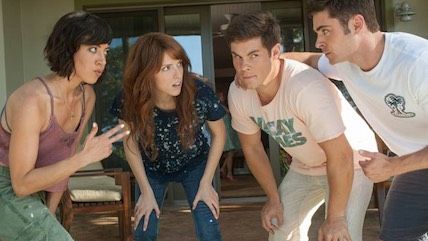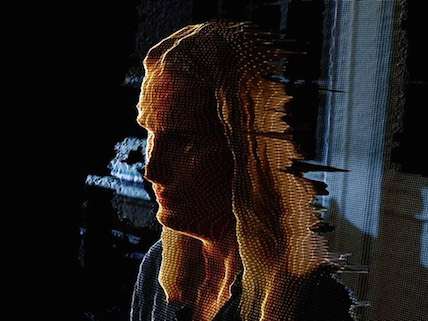Movie Reviews: Mike & Dave Need Wedding Dates and Zero Days
Light summer laughs, deep cyberwar doom.


Mike & Dave Need Wedding Dates succeeds as a fizzy summer comedy largely because it raises so few expectations. It's a movie in the Judd Apatow mold—what else?—filled with raunchy talk, stoned giggles, semi-raw sex gags, and moments of winning sweetness. Its premise, although based on a "true story," is silly enough not to have been. But the actors are generally in top form, and they rise above it. For a picture with such lightweight goals, it's pretty funny.
The structure is a clothesline for comedy bits. With their sister's wedding in the offing, two developmentally arrested brothers, Mike and Dave Stangle (Adam Devine and Zac Efron) are given an ultimatum by their father: in order to rein in their pee-in-the-punchbowl-style antics, which have capsized previous family gatherings, the nitwit siblings must bring dates to the nuptials—nice presentable girls who will keep them in line.
Mike and Dave don't know any women of this description, so they launch a date quest on Craigslist. The deal they offer two lucky ladies is sweet: an all-expenses-paid trip to Hawaii, site of the big destination wedding. The response is overwhelming, but unfruitful. When they are invited to promote their search on a TV talk show, the brothers are spotted by a pair of bong-hitting bar girls named Alice (Anna Kendrick) and Tatiana (Aubrey Plaza). These two are barely presentable, but scheming Tatiana believes they can pass. She will pose as a teacher (she dons glasses) and boozy Alice will impersonate a hedge-fund manager—a tougher sell. ("Being a good girl is hard," she says.) "We're gonna Bachelorette this shit," Tatiana vows.
After Tatiana engineers a life-threatening meet-cute with the brothers (you can see it in the trailer, along with most of the film's other highlights), the two prefab couples are off to Oahu. There they charm everyone in attendance, including bride-to-be Jeanie (the wonderfully squeaky Sugar Lyn Beard) and the boys' lesbian cousin Terry (delectably sardonic Alice Wetterlund). From this point the story devolves into a series of set-piece scenes. There's a group ATV outing, with dune buggies flying through the air, which leaves Jeanie with a banged-up face on the eve of her wedding. ("She looks like Seal," says one observer.) There's a Sapphic steam-room encounter, and a priceless erotic-massage interlude in which a naked masseur (Kumail Nanjiani) puts Jeanie through a series of positions like "the Bent Penguin" and "House by the Airport." (When the session is over, he warns her about the possibility of "aftershock orgasms.")
First-time feature director Jake Szymanski, working from a script by Apatow acolytes Andrew Jay Cohen and Brendan O'Brien (who also co-wrote the Neighbors movies), does an efficient job of hustling all these hijinks along, although some of the scenes—especially the ATV foray—start sputtering before the director finds a way to wind them up. And the movie collapses at the end into a song-and-dance mess apparently intended to recall the Pitch Perfect films (in which Kendrick and Devine also featured).
The stars almost hold all of this together, though. Devine's explosive mugging gets old, but Kendrick is as lovable as ever (although her character is not a lot unlike the one she played opposite Sam Rockwell in last year's Mr. Right), and Efron, the wittiest of contemporary movie hunks, displays old-school romantic-comedy chops. Plaza is the movie's dark heart, however: her Tatiana is more cynical and self-involved than any of the male characters on hand here. In what might otherwise be a run-of-the-mill bro-com world, she's a fresh breath of foul air.

Zero Days
Zero Days is a techno-horror story of a sort that the late Michael Crichton might have come up with—The Andromeda Strain 2, perhaps. But in Alex Gibney's documentary, the horror is real, not speculative, and it's still out there, lurking.
Gibney's film tells the story of the Stuxnet computer worm, a calamitous piece of malware cooked up—as no one will officially admit—by the US and Israel, possibly with the participation of British intelligence, in order to take down Iran's ominous uranium-enrichment plant at Natanz. By the mid-2000s, we're told, Israel had reached the limit of its forbearance with Iran's saber-rattling nuclear program: Iranian president Mahmoud Ahmadinejad had predicted that Israel "will be wiped of the face of the Earth," and Israeli prime minister Benjamin Netanyahu, addressing the UN, compared Iran to "Germany in 1938." As we hear from former Israeli Defense Intelligence Commander Amos Yadlin, one of the film's many talking heads, "We are taking very seriously the leaders of countries that call for the destruction and the annihilation of our people." An Israeli military attack on Iran seemed imminent; if it took place, the US would inevitably be drawn in.
President George W. Bush was approached by military and intelligence officers with an alternative to an all-out conflict: Stuxnet, a "fourth dimension of war." Stuxnet had only to be introduced into whatever network one sought to degrade; after that, exploiting "zero day" software vulnerabilities, the worm acted entirely on its own, taking over the programmable logic controllers (PLCs) found in power plants, power grids, telecommunications, and financial and healthcare services. Found in virtually everything, in other words. The possibilities were apocalyptic.
The first Stuxnet alarm was sounded in Belarus in 2010: a local security firm received reports from Iranian clients about an epidemic of computer shutdowns across the country, most damagingly at Natanz. In California, at the Symantec Research Labs, the Stuxnet worm was found to have been initially targeted at Siemens, the giant German engineering company, whose technology, illicitly acquired by Iran, was being used at Natanz, where enrichment centrifuges were suddenly blowing up. Mission accomplished, sort of.
Gibney, a prolific documentarian (Going Clear: Scientology and the Prison of Belief, Steve Jobs: The Man in the Machine), seeds the film with a churning, end-of-days electronic score and graphics that lean heavily on deep, waving fields of computer code. And he marshals a platoon of experts to testify to the subsequent awfulness of the terrible things we're learning. We hear from all sorts of cyberwar veterans, among them CIA, NSA, and Mossad officers, and security consultants both here and abroad. David Sanger, the New York Times cyber-espionage specialist, was struck by the intense secrecy surrounding the Stuxnet operation. "Not only were official government spokesmen unable to talk about it," he says, "they didn't even know about it."
But it didn't remain all that secret for all that long. The Iranians quickly figured out what was going on, and retaliated by hacking into American banks. Then, we're told, the Israelis created a souped-up, even more destructive version of Stuxnet and launched it on their own, and before long, in the way of all things digital, the worm had leaked out around the world. Which is apparently where we stand right now.
Exactly where that is, however, isn't made entirely clear. But extreme secrecy remains a confounding problem in discussing Stuxnet, since no one will, in fact, come right out and discuss it. In a theatrical touch, Gibney uses a digitally transformed actor to voice the words of unseen intel sources: "Israel used the weapon on its own in a way that blew the operation—and we can't talk about that?" Apparently not.
"Right now," says a former US Cyber Command officer, "the norm in cyberspace is, Do what you can get away with." Not good.


Show Comments (19)